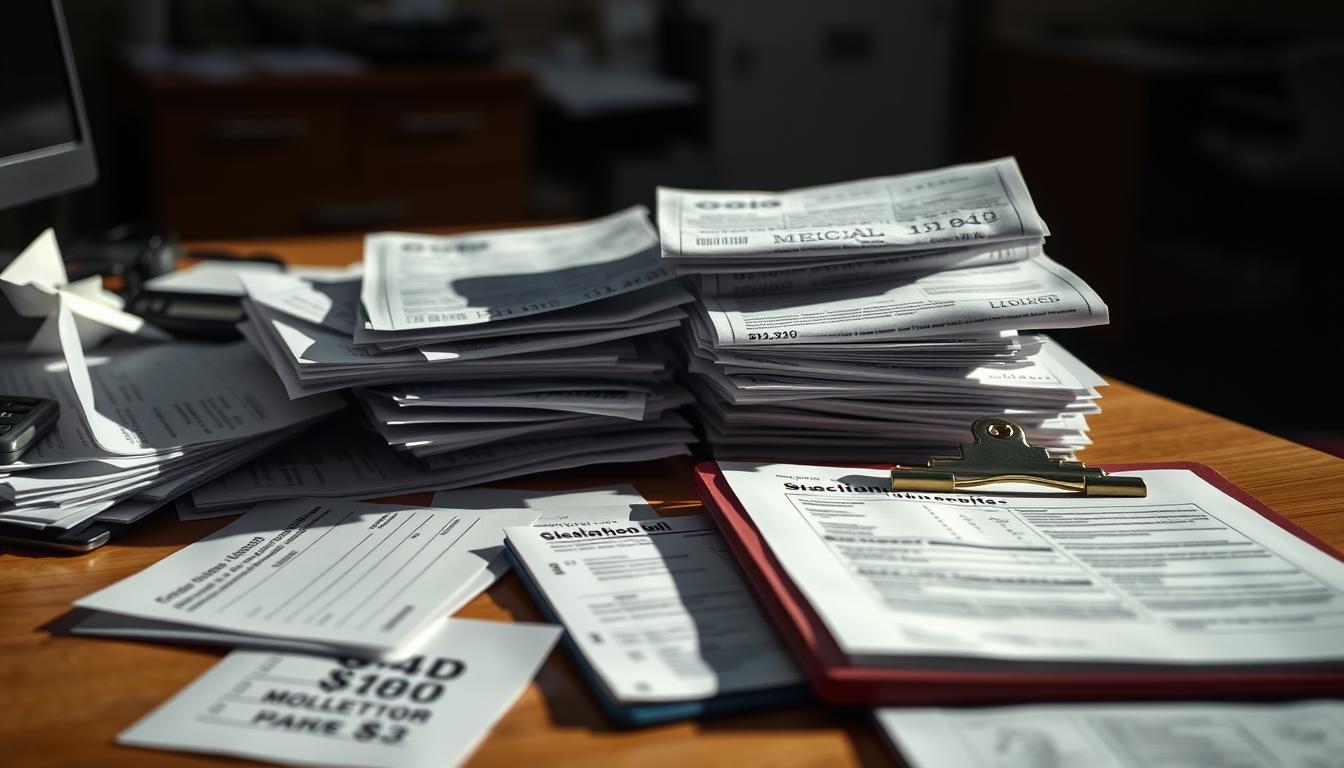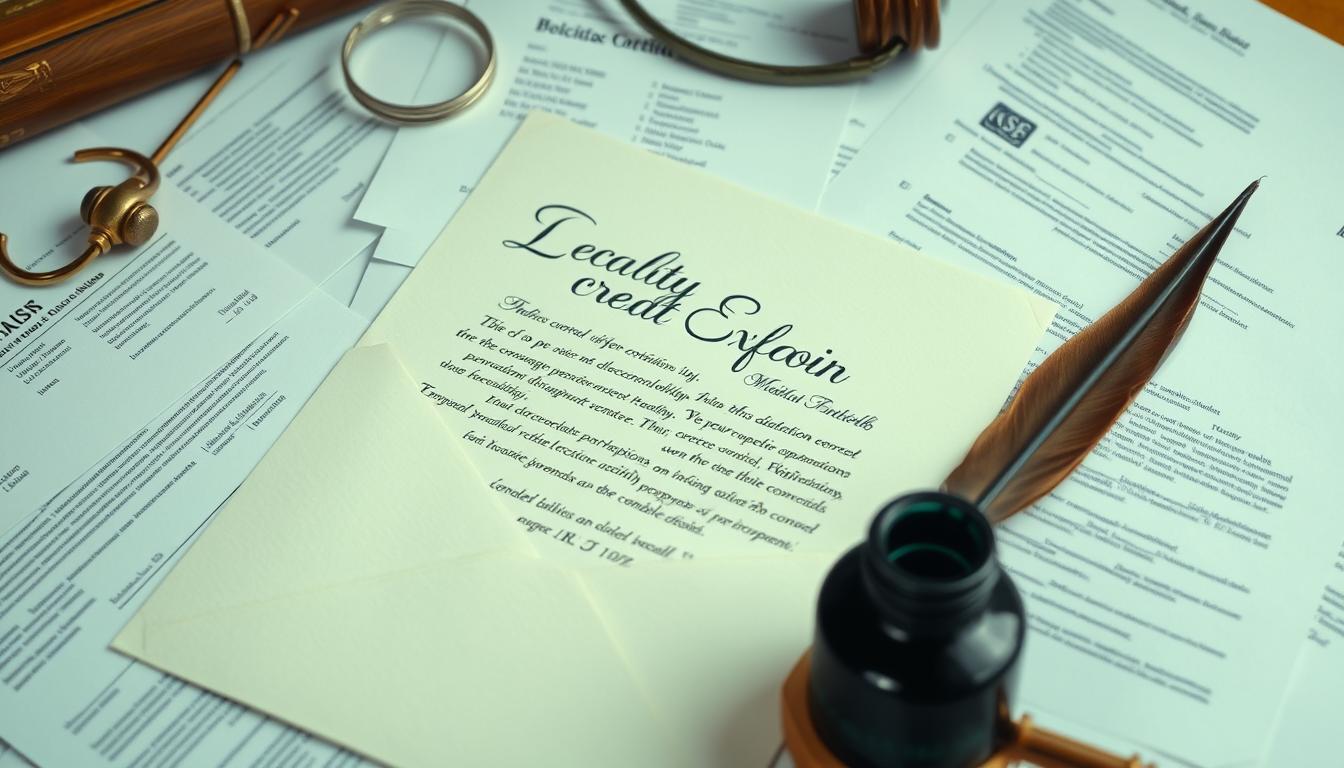Managing your credit report can be tough, especially with medical collections. These bills can quickly get out of hand. They can harm your credit score and financial health.
But don’t worry! You can take steps to remove medical collections. This will help improve your credit score. With the right approach, you can tackle this challenge head-on.
Key Takeaways
- Understand the impact of medical collections on your credit score and creditworthiness.
- Learn how to gather the necessary documentation to support your case for removing medical collections.
- Discover the key components of an effective letter to remove medical collections from your credit report.
- Explore strategies for negotiating with collection agencies and reaching favorable resolutions.
- Discover ways to prevent future medical collections and rebuild your credit after removing negative items.
This guide offers a step-by-step plan to write a letter removing medical collections. You’ll learn what to include and see a sample template. We’ll also share tips to boost your credit score.
Understanding Medical Collections on Your Credit Report
Medical collections can heavily impact your credit score and financial well-being. These unpaid medical bills can burden individuals both financially and credit-wise. Learning about medical collections is key to managing your financial health.
What Are Medical Collections?
Medical collections are unpaid medical bills sent to debt collection agencies. This happens when patients fail to pay for hospital visits, doctor appointments, or prescriptions. These unpaid debts are reported to credit bureaus, hurting your credit report and score.
Impact of Medical Collections on Your Credit Score
Medical collections on your credit report can greatly affect your credit score. They often carry more weight than other debts in credit score calculations. Credit scoring models view medical collections as signs of financial instability.
The impact’s severity depends on the collection’s details. Factors include the amount owed, reporting duration, and payment status. Generally, longer-reported medical collections can lower your credit score more.
| Type of Collection | Average Credit Score Impact |
|---|---|
| Unpaid Medical Collection | Up to 100 points |
| Paid Medical Collection | Up to 50 points |
The impact of medical collections can vary based on the credit scoring model used. However, they typically hinder your ability to secure favorable loan terms. This applies to credit cards and other financial products as well.
“Medical collections can have a substantial impact on your credit score, often more so than other types of debt. It’s crucial to understand this and take steps to address any medical collections on your credit report.”
Reasons to Remove Medical Collections from Your Credit Report
Removing medical collections from your credit report can greatly improve your financial health. It’s a crucial step in repairing credit and boosting your overall financial well-being. The benefits of this action can positively impact various aspects of your life.
Eliminating these negative items can significantly boost your credit score. A higher score makes qualifying for loans and mortgages easier. It also leads to better interest rates, saving you money over time.
A stronger credit profile opens up new opportunities. You may find it easier to rent an apartment or secure a job. Lower insurance premiums might also become available to you.
Taking steps to remove medical collections can make a real difference in your life. Your credit score influences many everyday aspects. Addressing these issues can lead to tangible improvements.
Resolving medical collections can provide a sense of relief and empowerment. It can help alleviate the stress associated with negative credit report items. This can restore your financial confidence and peace of mind.
Tackling these issues can lead to improved credit repair and better long-term credit scores. It’s a powerful way to take control of your financial future.
“Removing medical collections from your credit report is a powerful way to take control of your financial future and unlock a world of possibilities.
The reasons to remove medical collections are numerous and compelling. This crucial step can enhance your financial standing significantly. It can open doors to a brighter, more financially secure future.
Taking action on medical collections can help with debt negotiation. It’s an important step towards improving your overall financial health.

| Benefit | Description |
|---|---|
| Improved Credit Score | Removing medical collections can significantly boost your credit score, making it easier to qualify for loans, credit cards, and mortgages with better interest rates. |
| Increased Financial Opportunities | A higher credit score can open doors to renting an apartment, securing a new job, and even obtaining lower insurance premiums. |
| Reduced Stress and Improved Well-being | Resolving the burden of medical collections can provide a sense of relief and empowerment, leading to better financial confidence and a renewed focus on credit repair. |
Preparing to Write a Letter to Remove Medical Collections
Get ready to write a letter for removing medical collections from your credit report. Gather all necessary documents and review your credit report carefully. This preparation will help you identify errors and build a strong case.
Gather Supporting Documentation
Collect all documents related to your medical bills and collection agency activities. These may include:
- Copies of your medical bills
- Correspondence with the healthcare provider or collection agency
- Proof of payment or settlement agreements
- Documentation of any disputes or errors in the medical billing process
These documents will provide evidence to support your removal request. They’ll strengthen your case and increase your chances of success.
Review Your Credit Report
Check your credit report for accurate reporting of medical collections. Look for any issues such as:
- Incorrect account information
- Duplicate entries
- Medical bills that have already been paid or settled
- Collections that are past the statute of limitations
Spotting these problems is crucial for the dispute process. It will help you build a stronger argument for removing the medical collections.
Proper preparation sets the stage for a compelling letter. It increases your chances of successfully removing medical collections from your credit report.
Components of an Effective Letter to Remove Medical Collections
A well-crafted letter can help remove medical collections from your credit report. Include specific details to strengthen your case. Focus on your personal information and account details.
Use clear language to effectively communicate your dispute. These elements will boost your chances of success.
Personal Information and Account Details
Start with your full name, address, and relevant account numbers. This helps credit bureaus identify the items you’re disputing.
Include dates, amounts, and other key details about the medical collections. Be thorough and accurate in your description.
Clear and Concise Language
Use simple language in your letter. Avoid technical or legal jargon that might confuse the reader.
Explain why the collections should be removed. Common reasons include: the debt was paid, it was the result of a billing error, or the statute of limitations has expired.
Provide evidence to support your case. This can include receipts, correspondence, or other relevant documents.

A well-structured letter increases your chances of resolving the issue. Include key components to make your case stronger.
With the right approach, you can effectively dispute medical collections on your credit report.
Letter to Remove Medical Collections From Credit Report | Sample Provided
A well-written letter can help remove medical collections from your credit report. This step is vital for improving your financial health. We’ve created a sample letter to guide you through this process.
Our template includes essential elements to strengthen your case. It details the collection item and any errors. The letter politely asks for the item’s removal from your credit report.
Use this guide to craft a letter that fits your situation. A personalized approach can increase your chances of success.
“Taking the time to craft a well-written letter can make a significant difference in your efforts to remove medical collections and improve your credit report.”
An effective letter should be clear and backed by evidence. Follow the sample letter’s structure to boost your chances of success. This approach can help you remove medical collections from your credit report.
Review the sample letter and use it as a starting point. Customize it to fit your specific situation. A well-crafted letter can help resolve medical collections issues.
This step can significantly improve your overall financial standing. Take action today to start rebuilding your credit.
Sending the Letter and Following Up
After writing your letter to remove medical collections, it’s time to send it. This step is crucial for prompt handling by credit reporting agencies.
Following up diligently ensures your request is addressed effectively. It’s important to stay organized throughout this process.
Mailing or Faxing the Letter
Send your letter through certified mail with return receipt requested. This provides proof of delivery and a response timeline.
You can also fax the letter, keeping the transmission confirmation. Either way, keep documentation of your communication.
Send the letter to Experian, Equifax, and TransUnion. These are the three major credit reporting agencies. This ensures a comprehensive review of your credit report.
Follow-Up Strategies
- Monitor your credit report closely after mailing or faxing your letter.
- If you don’t see changes, call the agencies to check your request’s status.
- Keep detailed records of all communication, including dates and representative names.
- If needed, send a second copy of your letter as a reminder.
Persistence is key when following up on your request. Stay organized and proactive to increase your chances of success.
By maintaining detailed records and following up consistently, you’ll improve your odds of a positive outcome.

Dealing with a Negative Response
Removing medical collections from your credit report can be challenging. Credit reporting agencies may not always respond positively. It’s crucial to know your rights and how to address negative responses.
Understanding Your Rights
The Fair Credit Reporting Act (FCRA) gives you the right to dispute incorrect credit report information. This includes questionable medical collections. You can file a CFPB complaint if agencies don’t investigate or provide results.
The Fair Debt Collection Practices Act (FDCPA) shields you from unfair debt collection. If collectors harass you or break rules, you can complain to the CFPB. Legal action might be an option too.
| Your Rights | Key Legislation |
|---|---|
| Dispute inaccurate or incomplete information on your credit report | Fair Credit Reporting Act (FCRA) |
| File a complaint with the CFPB for failure to investigate your dispute | Fair Credit Reporting Act (FCRA) |
| Protect against unfair, deceptive, or abusive debt collection practices | Fair Debt Collection Practices Act (FDCPA) |
Knowing your rights is key to handling credit disputes effectively. It helps ensure your concerns are properly addressed. Stay informed to protect your financial well-being.
Negotiating with Collection Agencies
Dealing with medical collections can be tough. But you can use strategies to handle the situation. Negotiating with collection agencies is a key approach. Understanding settlement offers and “pay for delete” agreements can help you resolve debt and boost credit.
Settlement Offers
Collection agencies often accept settlement offers. This lets you pay less to fully resolve the debt. It can help avoid long-term credit report impacts. Be ready to show documents and explain your finances when negotiating.
Pay for Delete Agreements
A “pay for delete” agreement is another smart tactic. You pay the full amount owed. In return, the agency removes the negative item from your credit report. This tackles the root problem and can improve your credit score.
Persistence is crucial when negotiating with collection agencies. Explore settlement offers and pay for delete agreements. These methods help you resolve medical collections actively. They can also aid in restoring your financial well-being.
Preventing Future Medical Collections
Avoiding medical collections on your credit report is vital for financial health. Review bills carefully and address errors promptly. These steps can prevent collections and protect your credit score.
Reviewing Medical Bills Thoroughly
Examine each line item on your medical bills for accuracy. Check services, charges, and insurance coverage. This diligence helps identify and resolve medical billing errors before they become collections.
Understand your medical expenses, including co-pays, deductibles, and out-of-pocket costs. Compare bills to your insurance provider’s Explanation of Benefits (EOB). Contact your healthcare provider or insurer if you spot discrepancies.
- Understand the breakdown of your medical expenses, including any co-pays, deductibles, or out-of-pocket costs.
- Compare your bills to the Explanation of Benefits (EOB) from your insurance provider to ensure proper coverage and billing.
- If you notice any discrepancies, contact your healthcare provider or insurance company promptly to address the issue.
By reviewing medical bills thoroughly, you can take proactive steps to prevent future medical collections. This practice helps maintain a strong credit profile.
| Tip | Description |
|---|---|
| Stay on Top of Payments | Ensure that you make timely payments on your medical bills to avoid debt going to collections. Set up payment plans or negotiate with providers if necessary. |
| Communicate with Providers | If you encounter any issues or discrepancies with your medical bills, don’t hesitate to reach out to your healthcare provider or insurance company to resolve them. |
| Monitor Your Credit Report | Regularly review your credit report to identify and address any medical collections or other negative items that may have appeared. |
These proactive steps can effectively prevent future medical collections. Stay vigilant and address issues promptly to maintain strong financial health.
Rebuilding Your Credit After Removing Medical Collections
Great job on removing those medical collections from your credit report! It’s time to rebuild your credit score and secure your financial future. With the right strategies, you can rebuild credit, improve credit score, and regain financial control.
Start by closely monitoring your credit monitoring and regularly reviewing your credit report. This helps you spot new issues or inaccuracies quickly. Consider using a credit monitoring service or checking your report through trusted sources.
Commit to financial management best practices. Pay all bills on time and keep credit card balances low. Avoid unnecessary debt to show responsible rebuild credit behavior.
- Regularly review your credit report for accuracy and any new issues.
- Make timely payments on all your bills, including credit cards, loans, and utilities.
- Keep your credit card balances low, ideally below 30% of your total credit limit.
- Avoid taking on new debt, and focus on paying down existing balances.
- Consider becoming an authorized user on someone else’s credit card with a good payment history.
| Credit Rebuilding Strategy | Potential Impact on Credit Score |
|---|---|
| Timely Bill Payments | Significant Increase |
| Low Credit Utilization | Moderate Increase |
| Becoming an Authorized User | Moderate Increase |
| Paying Down Existing Debt | Gradual Increase |
Rebuilding credit takes time and dedication. Stay consistent with your financial management practices. You’ll see your improve credit score rise and regain financial stability.

Conclusion
Addressing medical collections can greatly impact your financial health. Understanding these collections and their effect on your credit score is crucial. You can take control of your credit profile by learning how to remove them.
Medical collections can be removed with a well-crafted letter. Taking steps to prevent future medical debt helps maintain a healthy credit score. Use the strategies provided to effectively resolve medical debt and repair your credit.
Your credit profile is vital for your financial health. By addressing medical collections, you can improve your credit score. This can lead to better financial opportunities and overall well-being.
Take action today to start your journey towards credit repair. A stronger financial future awaits you. Don’t delay in taking the necessary steps to improve your credit situation.

